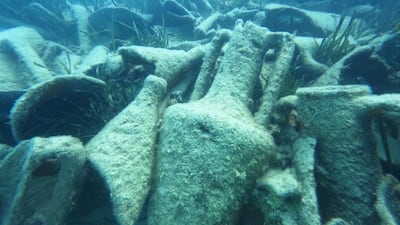Six years ago, Egyptian engineer and entrepreneur Hussein Mesharafa was lounging on the beach near his home on Egypt’s north coast when Ahmed, a fisherman and lifeguard, approached holding a peculiarly shaped and very old amphora, a kind of ancient Greco-Roman jug.
“How much would one of these fetch, do you reckon?” Ahmed asked Mr Mesharafa, who joked that it would probably fetch him a few years in prison, as Egyptian citizens are not allowed to sell antiquities.
Ahmed had happened upon the first trace of an archaeological discovery announced by Egypt’s Antiquities Ministry this month – that of an ancient merchant ship believed to have been used to ferry wine between Egypt and Greece in the third century BC.
“Where did you find this?” Mr Mesharafa asked, after realising the amphora was most likely an ancient relic.
Ahmed said it had been caught in his fishing net “somewhere over there, pointing in the direction of Italy”, Mr Mesharafa told The National.
“My two sons and I decided to take our Zodiac [a kind of motorised inflatable boat] out to where he was pointing and do a quick sweep. It took us two years to find it."
"We started our search with basic equipment but when we failed to find it, we returned later with more heavy duty robotics and a sonar scanner."
Mr Mesharafa has spent decades working in undersea exploration, first for oil and gas companies in the Mediterranean before moving into underwater archaeological exploration with Seasplit, a robotics company he founded in 2020.
Using patented technology made by Egyptian engineers working for him, Mr Mesharafa and his sons first found the site of the sunken ship in 2020, less than three years after Ahmed emerged on the beach holding the amphora.
They lost the site again because they did not place the correct GPS markers to be able to relocate it.
“At that point we didn’t really take it seriously," he said. "It was a family adventure of sorts, but when I showed some photos I took of the site to an archaeological expert, who is a friend of mine, he said this was serious business and the government needed to be notified.”
Exploring for antiquities, whether by digging into the ground or diving under the sea, is prohibited by Egyptian law that allows only missions approved by the government to search for relics.
It would more than two years before Mr Mesharafa received a call from his sons Hassan and Moustafa while he was on a trip abroad, who told him they had finally found and marked the site.
It was then he decided to notify the Antiquities Ministry that he had found an ancient ship.

Mr Mesharafa is now awaiting a deal with the ministry in which he would provide equipment and technical expertise for undersea exploration on Egypt’s north coast. In exchange, he would be given permits to use his robotics on the coast.
“A big part of this is my passion for undersea exploration, another is a kind of patriotic sentiment to discover the country’s treasures." he said.
"But another aspect that excites me about the partnership is the chance to develop and showcase my company’s robotic vehicles and to explore more of the north coast with them."
A deal has been approved by the ministry, Mr Mesharafa said, with final approval to come from the Armed Forces, which has not yet announced its decision on the partnership.


